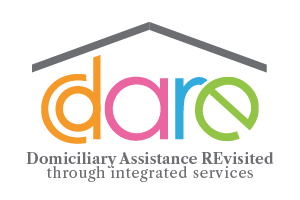
The Context:
DARE Project – Domiciliary Assistance REvisited through Integrated Sevices – enhances the reflection on a particular aspect of the European welfare: the services for home assistance.
One of the main needs of the present Care and assistance services system is that of experiencing more efficient organizational models. Together with this structural innovation, it emerges the need to reshape the (professional) profiles and the competences (formal and informal) of the staff involved in the different phases of the care/assistance process:
- overcoming the traditional division of the social assistance services based on target groups – disabled adults, disabled minors, elders, etc., in order to get closer to a holistic approach of the home assistance
- introducing a service of continuous training/retraining program, in order to give the families the possibility to hire (di collaborate with) qualified professionals from the care/assistance sector, or volunteers who have those transversal competences that allow to perform more types of interventions and work with different categories of beneficiaries;
proposing some training paths for the paid informal caretakers who already work in the home assistance contexts, usually having low specific competences - improving the life quality of the assisted persons, of the caregivers (who often neglect their personal life and needs) and of the informal caretakers (often migrant women)
- guaranteeing a coherent answer, also in emergency situations, to the numerous types of requests regarding information, assistance, guidance and connection with the responsible public institutions
- introducing, besides the flexible services (in terms of schedules and continuity) dedicated to dependent persons, “spot services” that may answer the requests regarding home management, home maintenance interventions, baby-sitting, after school assistance, support for minors with behavioural and learning disorders, etc.
In order to envisage a really innovative welfare, homogenous in terms of quality and quantity, the families’ needs regarding “domiciliary assistance” have to be interpreted with a wider view, accompanying the aspects exclusively linked to the care for dependent people, to diversified types of “home interventions”.
Consequently, the project is based on the exchange of best practices regarding structured or half-structured models of “desks”/”services”/”centres” dedicated to the integrated home assistance, through 5 transnational meetings/visits by the contexts in which the seven project partners act.
Objectives:
The main objective of the project is the creation, through the partnership, of a significant community of practice, able to propose and to transfer, on a long term, innovative alternatives of domiciliary assistance systems, with a mixed management between public and private, able to overcome the traditional division of the welfare services based on target groups – disable adults, disable minors, elders, by observing, during the exchanges of best practices:
- the professional and relational competences of the staff involved in the centers/desks of integrated services
- the continuous training/retraining services in order to adapt the professional profiles and the competences (formal and informal) of the involved staff.
Through the continuous dissemination activities, another project objective is the sensitization of the local/national/European stakeholders regarding the need to re-think and re-plan the domiciliary assistance system with an integrated vision.
Read the press release of the project launch: Press release – EN
Envisaged Activities and Roles:
Coordination and Financial Management:
IRPEA Foundation
Methodological Supervision:
Local Technical Committee (created for a KA2 Erasmus+ project, SALTO, on social animation – made up of different public and private institutions for elderly and disabled persons, and parents’ associations)
- 5 Transnational Project Meetings (at the same time with the 5 Visits)
- 5 Visits for the Exchange of Good Practices (1 in each country of the partnership) – in order to observe structured and semi-structured models of “integrated services for domiciliary assistance” managed by public and /or private institutions
- Final Analysis of the Best Practices Evaluation (Observation) Forms (C’entro and CDE Corse)
- Dissemination – Disssemination Plan (Eurocarers)
- Monitoring (IRPEA and C’entro)
- Evaluation and final Focus Group (IRPEA and C’entro)
Partnership
ITALY
Coordinator:
Fondazione Irpea – Istituti Riuniti Padovani di Educazione e Assitenza, Padova
http://www.irpea.it
Associazione C’entro
http://www.associazionecentro.it
FRANCE
CDE-SAP Corse – Cooperative for the Development of the Employability in the Care Services for the Persons
www.cdesap.com
BELGIUM
Eurocarers – European Association Working for Carers
https://www.eurocarers.org
SASB Bruxelles – Service d’Aide aux Seniors bruxellois
https://www.bruxelles.be/aide-et-services-pour-seniors
PORTUGAL
APCC – Associação de Paralisia Cerebral de Coimbra
http://www.apc-coimbra.org.pt
ROMANIA
DGASPC Sector 1 – General Direction for Social Assistance and Child Protection of Sector 1, Bucharest
www.dgaspc-sectorul1.ro
Duration of the project:
24 months
(2nd of October 2017 – 1st of October 2019)
Last Updated on January 29, 2019


